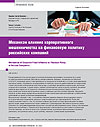Mechanism of Corporate Fraud Influence on Financial Policy of Russian Companies
The present article discusses the features of the corporate fraud and shocks influence on the capital structure of the company. Actions of Russian companies related to distortion of the accounting reports, implementation of deals with some interest (exceeding authority by the board of directors), sham transactions aimed at withdrawal of assets from the company (damage to the company and its shareholders), as well as obtaining unjustified tax benefit, contribute to financial restrictions and increase the lack of companies’ transparency. On the other hand, the impact of adverse market shocks makes Russian companies to focus on saving large amounts of money inside the company. In addition, the paper examines the effect of adverse shocks on changes in the debt policy of the company. Attention is drawn to the link between corporate fraud and financial policies of the company in view of adverse shocks impact on the sources of funding. Fraud causes the situation when Russian companies tend to save more money because of additional restrictions related to involving debt finance. Analysis results suggest that companies choose the internal source of financing as less expensive, following the hierarchical theory of optimal funding. The accumulated monetary reserves allow them to overcome at lower costs the effects of adverse shocks that determine financial instability. Corporate fraud and adverse shocks affect the company’s financial policy, forcing it to rely more on internal financing and to constantly increase its cash reserves, solving the problem associated with financial constraints.



